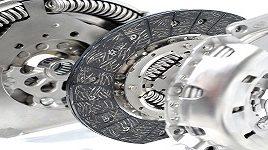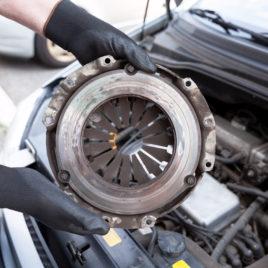Do you need clutch repair in Portland?

If you landed here, the answer is likely yes. Where should you start, though? Depending on the issue, age, and wear of your clutch, you may be better off with a replacement. That’s what we work to determine, and that’s why so many manual drivers choose Steve’s Imports as their auto repair shop for clutch repairs in Portland. It all starts with diagnostics performed by one of our ASE Certified car mechanics or technicians. Choose the best auto repair in Portland. Contact us now.
Are you experiencing clutch issues?
What are the Signs of Clutch Failure?
- Your vehicle is grinding when you shift. Your clutch or friction disk is sticking. It can indicate a wide range of problems, mostly to do with the mechanical release system or clutch master cylinder. Your clutch pedal may also need to be adjusted.
- Depressing the shift pedal causes squealing. Your throw-out bearing is likely at fault. It may be damaged or lacking lubricant. A pilot bearing can also cause the same symptoms if it’s leaving enough space for the clutch disc and input shaft to vibrate.
- The clutch pedal is noisy with the engine off. This is usually caused by a lack of lubricant, so cables and rods end up scraping against one another. An experienced clutch repair technician in Portland can quickly narrow this down to identify the root problem area.
- The clutch pedal is spongy. This is typically caused by air in your hydraulic system line.
- The clutch pedal is loose. This changes depending on whether you have a hydraulic release mechanism or not. Anything from fork damage to pressure-plate issues, low fluids, leaks, and damaged master cylinder seals can be responsible.
- Clutch pedal won’t rise. If your clutch pedal is stuck on the floor, you may have a bind in the release bearing or linkage.
- The clutch pedal is difficult to push. A stiff clutch pedal is likely due to the release mechanism. Any of these components may be at fault.
- Pulsing from the clutch pedal. This is typically due to vibrating parts and indicates damage to a lever or warping of the flywheel. Even something like a poorly aligned transmission housing can cause pulsing.
- Clutch vibrates or chatters during acceleration. There are more reasons this can occur than any other problem. Flywheels, clutch lining, discs, pressure plates, and bearings may all be responsible. This can also occur when motor mounts are bad.
- Slippage. If your vehicle is slipping out of gear it’s definitely time for a clutch replacement.
- The smell of burnt toast. This means your clutch is overheating; a common problem with city driving.
- Harsh shifting. Often caused by an oil leak onto the clutch plate. Repairs will stop the leak.
- Clutch won’t disengage. This is most often caused by hydraulic linkage failures.
- Improperly adjusted linkage.
- Air in the hydraulic line.
- Worn clutch release/throw-out bearings.
- A stretched or broken clutch cable.
- Defective or leaky master/slave clutch cylinder.
- Non-matched aftermarket clutch components.
- Your vehicle starts slow but your engine rpm’s are high. This is a common sign of a slipping clutch. It means your clutch disc is worn out. This prevents your vehicle from transferring power to your transmission. The clutch can also release sooner.
- How can I test my clutch?
- Start your vehicle with the emergency brake engaged.
- Depress the the clutch pedal.
- Shift your vehicle into 2nd or 3rd gear and rev the engine to about 23 – 2600 RPM’s.
- Release your clutch pedal slowly.
- Did your vehicle stall? If it didn’t that means you’ve got a slipping clutch.
- How can I test my clutch?
- You can’t shift into reverse. That means you’ve likely got a problem with a warped clutch plate, linkage malfunction, or even issues with your linkage adjustment.
- You can’t put your transmission into gear. This could indicate a master or slave cylinder failure if you have a hydraulic system. Issues may lie with the shift lever assembly, release lever, pressure plate, control cable, or even clutch disk if you have a mechanical assembly.
- First set your parking brake. Start your vehicle and put the clutch into neutral.
- Do not push in the clutch. Listen carefully for a growling sound. If you don’t hear anything, move to step three. If you do hear something, it is more likely you have a transmission problem than a clutch issue.
- Keep the car in neutral. Slowly push on the clutch while listening carefully. If you hear a chirping noise, you may have an issue with the throw-out bearing or clutch release. If you don’t hear anything, move to step four.
- Press your clutch to the floor. A squealing noise indicates an issue with the bushing or pilot bearing.
Do you need clutch repairs or a clutch replacement?
You may be surprised to learn that manual vehicles aren’t the only ones with clutches. Many automatic transmissions use them as well. While a manual clutch is dry, an automatic clutch pack is always covered in transmission fluid. Both are capable of wearing out, and when your clutch starts to give out you’ll know it. While we can’t reverse a slipping clutch, Steve’s Imports can replace it. If you’re experiencing the first symptoms of a damaged clutch, bring your vehicle in today. Immediate servicing can greatly slow slippage.

What else can our clutch specialists do for you?
We can also perform complete clutch rebuilds or replacements. Whatever issue you’re having, your solution is just a short drive away. There’s a reason our customers come back again and again. They trust us to do the right thing because we always do. Better service begins with the right garage. Choose better, and call or contact us to schedule your clutch repairs today!
